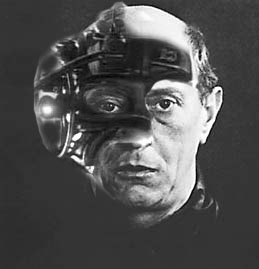Subtitle 1: Resistance is Futile
Subtitle 2: Star Trek vs. The Berg
(It will really help if you have some kind of Trek background here.)
I have a theory about almost anything by Debussy. If you put his music behind the original Star Trek shows it works perfectly as the backdrop music when Kirk is spouting off some soliloquy, or when they are on a strange planet (which is much like the one they were on last week).
As I listen to The Prelude to “The Afternoon of a Faun”, I swear I could see Captain Kirk with some green chick on a planet, where the fake plastic flowers are purple and green. The flute descending and rising with the shimmering strings behind…well it just puts me in the mood to see some bad acting.
See if I’m not right:
The calm, flowing melodies beautifully paint the picture of an afternoon on a clearing (where alien deer roam perhaps?). Flute gives way to clarinet, as the score gets deeper, and more complex. It would be hard to imagine the composer of this piece moving totally into atonality, and in fact Debussy flirted with and came back from that direction. He was not assimilated by it.
Schoenberg and his drones, Webern and Berg however, were fully seduced by the dark side of atonality and the pure difference of it.
In a similar fashion to how Debussy would have fit so well in the classic, sixties Star Trek score, Berg’s Three Orchestral Pieces could be scored behind modern Star Trek’s most feared foe. The horror, the dissonance, the pure mechanical and obtuseness of it fits the evil robot Borg race, as they seek to take from what has been and use what they want for their own devices.
Almost scary as it gets going, with twists and turns chromatically, percussion slamming out of nowhere like a bad acid trip in a haunted house, The Berg come at you from all directions as seems typical with atonal pieces. Shields are not holding! There seems no defense (except to turn it off as one critic in his day stood and demanded.)
I’ve always felt atonal music seemed random, obtuse on purpose, as if the composer was drunk and just wrote whatever notes he fashioned. “Ha, let’s hear this together. That will freak them right out. Resistance is futile, helpless turn of the century earthlings! You will be assimilated to this new music, and like it!”
In the Three Orchestral Pieces third movement, Berg both paid tribute to and mocks Beethoven’s Fifth. You can almost hear Schoenberg, Webern and Berg speaking monotone as one to the previous Viennese School composer. “We take what we want, and will add your musical and technological distinctiveness to our own.”
While you can hear snippets of atonality with Debussy, it’s obvious that melody just won out. Like the malevolent Federation in Star Trek that only seeks to seek out new life and new civilizations in peace, Debussy was willing to explore the unknown. He just made sure he came back to Earth.
But Schoenberg (classical music’s equivalent of the Borg Queen) and his drones were not interested in beauty, peace, and easy harmony. They craved disharmony, all for various reasons probably. And like the Borg, once they got a taste of the power, the complete look of astonishment, and the sheer outrage of those who did not understand what they were doing, they knew they were doing something right.
In the end, they formed a new race of being, a new complete school of music.
And the galaxy of music would never be the same.
Kirk out.
—
John Eric Copeland loved Star Trek long before music history, but now sees the value in both. KAAAAAAAHN!

For about fifty years, classical music has been adrift, lost in a sea of noise, complexity, and atonality. The final arbiter of what is good is the audience and the barometer for measuring what is worthy is the number of times a work is performed. As Oscar Wilde said, “A book that's not worth reading twice, is not worth reading at all.” 99% of what our orchestras and artists play was written before 1940. Audiences need NEW music, but it must be truly good. There is the problem – albeit in a nutshell.
Good thoughts.
How do we write new classical music that 1) will be embraced by audiences and 2) that aren't derivative.
I hate atonal music. Hate.
But I know where they were coming from (deep space). Seriously, they were just trying to do something new. Anything new.
Unfortunately, it was never something that would be embraced by large audiences forever like a Mozart Symphony or Chopin Piano work.
EC
You can't write “new classical music”, by definition.